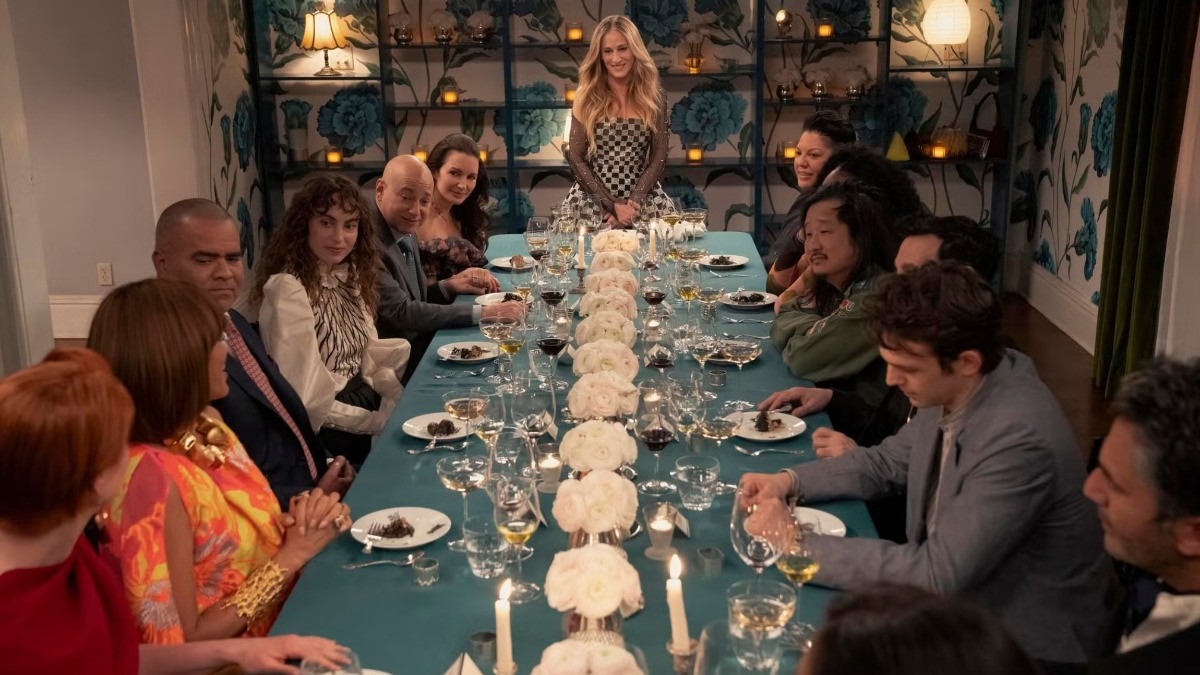Dakota Johnson and Tina Fey make a refreshing case for fun, unfiltered interviews
Flaws, quirks, and controversies, here's why we need to bring back authentic, non-media-trained press runs.


Last week, Dakota Johnson was interrupted by an earthquake. Midway through a promotional interview for her new Spider-Man spin-off film, Madame Web, the ground started to shake. It was a chaotic moment that felt like a metaphor for her entire press tour.
Days earlier, asked about a quote from the Madame Web trailer that had gone viral for its silliness, Johnson made headlines by refusing to play along with the interviewer. She could have laughed it off, but instead, she offered a wry response that landed somewhere between deep wisdom and a Lana Del Rey album title: “Isn’t any sentence out of context, out of context?”
Online, my timeline—which, admittedly, skews toward women and gay men whose weekly screen-time reports would make most people gasp—has been obsessed with Johnson’s media appearances, declaring that she “deserves an Oscar for this press tour.” Promoting the superhero movie, Johnson has given some refreshingly frank answers. Speaking with French fashion monthly L’Officiel, she described the bleakness of Hollywood right now: “Everyone who makes decisions is afraid. They want to do the safe thing, and the safe thing is really boring.” In another interview, Johnson admitted she hates filming CGI scenes, and on Late Night With Seth Meyers, she described filming a cameo for the series finale of The Office in 2012 as “the worst time” of her life.
Johnson’s press tour—and her interviews in general, like the time she infamously called out Ellen DeGeneres on the former comic’s own show—have hit a nerve because it’s so rare to hear a famous person tell us what they really think. We’re trapped in a vicious cycle: In an increasingly media-trained and AI-saturated world, our desire for authenticity keeps growing, but social media and outrage clicks disincentivise celebrities from saying anything too candid. All it takes is one clumsy comment or something taken out of context, for an entire content stream—threads, infographics, memes, and think pieces—to emerge and dominate the news cycle for days.
Look at what happened in 2019 when Emma Watson described herself as “self-coupled.” The moment generated hundreds of articles, posts, and even radio and TV segments, but few of them noted it was pulled from a much longer conversation, which spanned everything from trans-inclusive feminism to Britain’s colonial history and Watson’s awakening as an activist. When interviews are serialised across publications, then heavily discussed on social media, the discourse tends to get flattened. People don’t actually consume the whole story—they feel they’ve seen enough snippets to keep up with the conversation. (This happens with celebrity tell-all memoirs, too.)
In this environment, it’s not just Dakota Johnson who feels like a breath of fresh air. Last month, on the promotional tour for the 2024 Mean Girls musical remake, Reneé Rapp made an appearance on Watch What Happens Live. The 24-year-old declared that she was “very ageist”—much to the horror of host Andy Cohen. “Are you supposed to say that?!” said Real Housewives star Gizelle Bryant, to which Rapp responded: “No!”
Rapp was just kidding around (I think?) and clarified she was mostly talking about millennials who talk down to her. But sure enough, articles about fans being “divided” and a so-called “backlash” soon appeared. Bring back un–media trained celebrities! I thought as my heart sank, imagining Rapp’s reps locking her in a room and indoctrinating her to give boring answers.
Speaking of Mean Girls, franchise mother Tina Fey nailed the problem on last week’s Las Culturistas podcast. During a segment of the interview when the guest is asked to rant about an opinion, Fey dropped some astute industry wisdom. She told co-host Bowen Yang—who stars on Saturday Night Live and has a successful acting career—that he was now “too famous” to give his real opinions on films. “You have a problem with Saltburn? Shhh. Quiet luxury,” Fey said. “Keep it to yourself. Because what are you going to do when Emerald Fennell calls you about her next project, where you play Carey Mulligan’s co-worker in the bridal section of Harrods, and then act three takes a sexually violent turn and you have to pretend to be surprised by that turn?!”
Fey is right that fame and success can flatten criticism. She told Yang and co-host Matt Rogers to “learn from Ayo”—alluding to actor and comedian Ayo Edebiri, who poked fun at Jennifer Lopez a few years ago on a podcast, describing J.Lo’s career as “one long scam.” The comments resurfaced just days before Edebiri hosted SNL—where Lopez was the musical guest.
Fey knows words have consequences; in 2019, she called the Met Gala a “jerk parade” and has not been invited back since. The fear of a rescinded red carpet invite would keep a lot of celebrities quiet, even if they didn’t actually enjoy the party. This is why it’s so startling when celebrities do openly express their opinions—like Hugh Grant, who, when asked about making Wonka, responded: “I couldn’t have hated the whole thing more.” Or when Cillian Murphy, on the press tour for Oppenheimer, admitted he only “endures” talk shows because he’s “contractually obliged” to appear on them.
As a journalist, I’ve often wondered whether authenticity is even possible in conversations between interviewee and interviewer—roles which come with an in-built element of filter and performance. A desire for more authentic encounters might be why “unfiltered” spaces like podcasts, the irreverent Watch What Happens Live, or Amelia Dimoldenberg’s Chicken Shop Date YouTube series have become such popular promotional tools. Many fans enjoy watching celebrities sobbing in pain after eating spicy wings on Hot Ones because spaces like that feel more real—at least until they become too big or too slick. (Or, as Fey warns, their hosts become too famous.)
Not to be all “Won’t somebody please think of the celebrities!” but I understand why so many would rather eat hot wings than share their searing hot takes with us. Imagine people on the internet dissecting your every word, then making a sweeping judgment about your character! This tends to come down particularly hard on women, too: Look at Jennifer Lawrence, first deemed charming and relatable, then dismissed as annoying, and now back to being everyone’s favourite at breakneck speed.
There is a balance, though, because dealing with constructive criticism is part of any artist’s job. In 2021, a profile of Succession star Jeremy Strong prompted a squad of celebrities—including Jessica Chastain, Adam McKay, Aaron Sorkin, and Anne Hathaway—to publicly defend him. This is what they’re so upset about?! I thought, after reading the interview. The responses felt disproportionate as if the stars had forgotten that interviews are supposed to be cultural analysis, not fawning praise.
Reacting to Fey’s Las Culturistas interview, Edebiri later commented, “LEARN FROM ME.” But it would be a shame if the takeaway from her awkward situation with J.Lo is that more people should censor themselves, rather than that we need to learn to evaluate comments in the context in which they were intended. Did Edebiri really need to be “held accountable”—or tearfully apologise—for making a few jokes about one of the most famous and successful women in the world? If we want celebrities to be more authentic, we should be prepared to meet them halfway—particularly if, like Edebiri, what they’ve done was embarrassing but made no lasting harmful impact.
The internet’s long memory can have real ramifications for cultural criticism. It’s not just fan backlash—there’s a whole other side of it behind the curtain, where famous people and journalists don’t want to say or write anything that will piss off someone they might want to work with one day. It’s all understandable, but the result is a media ecosystem that often feels a little too professional to be any fun. That’s why it was so refreshing when, as negative reviews of Madame Web began to emerge, Johnson claimed that “drastic changes” had been made to the script and film after she signed on. As a viewer, that’s the kind of dirt I actually want to hear.
On Las Culturistas, both hosts reacted with gay shrieks when Fey dropped a quote that instantly became canon: “Authenticity is dangerous and expensive.” The question is: Should it have to be?
This article originally appeared in Harper's Bazaar US.
Also Read: 'Never Have I Ever' star, Poorna Jagannathan shares how she gets better with age.










